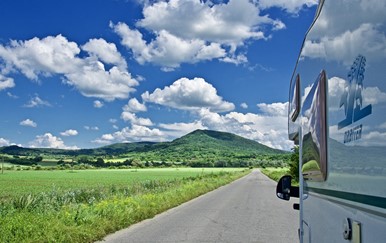Isn't it the dream to buy a motorhome, travel by day and park up anywhere by night? Pitch up camp and spend the night under the stars. As idyllic as this sounds, there are rules you have to follow and that includes where you can and can't park overnight.
Wild camping (or off-site parking, free camping or even free overnight parking, as it’s also known as in the motorhome community) may be a term you’ve heard of, but many are unsure of what it does and doesn’t allow. In this guide, my aim is to help you find everything you need to know about wild camping in the UK so you can have a great experience!
What is motorhome wild camping?
For many motorhomers, wild camping is one of the best ways to spend a night in your vehicle and explore. It allows you to get away from people and the noisy overcrowded campsites and fully engage with new and natural surroundings.
Technically, it’s described as staying in your motorhome away from any facilities – that’s right, no electric hook-up. It’s free and normally in the middle of absolute nowhere surrounded by nature – my idea of absolute bliss!

The different meanings of wild camping
Admittedly, things can get a little muddily when it comes to the actual term ‘wild camping’, especially when you start to throw motorhomes and campervans into the mix.
More traditionally, wild camping is defined and more commonly understood as camping in tents in the middle of nowhere. It typically includes walking long distances to keep the experience more raw and natural and being at one with your surroundings. This form of wild camping tends to be much more accepted than wild camping in a motorhome, but more on this later and the legalities to be aware of later.
Is wild camping safe?
The next question we find a lot of people asking is whether or not wild camping is safe. I can imagine many of you will be feeling nervous and expecting everything to go horribly wrong – I know I would be! However, it’s not as scary as you think and being equipped and knowing the rules makes it an extremely safe and great way to immerse yourself in nature and serenity.
Off-grid, free motorhome camping – are they all the same thing?
At the end of the day, wild camping in a motorhome, camping off-grid and free motorhome camping all boil down to pretty much the same principles. They include enjoying the freedom of not being tied to a campsite or so reliant on our modern luxuries and simply getting away from it all, switching off and enjoying the slower pace of life.
I think most of us can agree that the simple notion of getting away from everything for a few days and enjoying the comforts of your motorhome but in the peaceful surrounding of nature, sounds very appealing indeed! But as I alluded to already, when it comes to motorhomes and campervans you simply can’t just park up anywhere – there are strict rules that need to be followed.
The legality of wild camping
As good as it sounds, there are some legalities around wild camping that you need to be aware of. Firstly, wild camping isn’t exactly legal in England, Wales or Northern Ireland. It all comes down to the fact that the majority of land in the UK is owned by someone, so you need their permission to stay. We would not advise staying in a remote area without permission. You want to avoid trespassing and trespassing is exactly what you’d be doing.
Scotland, on the other hand, is a different story but not without motorhome-sized limitations of its own. Thanks to the Scottish Outdoor Access Code, wild camping is legal there – as long as it’s ‘lightweight camping’. Technically speaking, this just means taking the lightest and least amount of gear possible. However, bear in mind, that this Code only gives access rights for any non-motorised activity, therefore, as like the rest of the UK you will still need to seek the landowner’s permission before setting up your motorhome.
I must reiterate just how important it is to abide by the law and plan out your destinations to make sure are all acceptable!
Secondly, motorhome and campervan parking rules are strict – and they need to be. When buying a motorhome or campervan please don’t assume that you are allowed to park wherever, whenever you want. That is not the case. Unless the area you’re looking at is featured online or can be found on an app, I would avoid staying or parking there – again, remember you don’t want to trespass or give motorhomers a bad reputation.

Rules and regulations to follow
There are also rules to follow.
The main rule being if you haven’t found the wild camping spot online you need to get the landowner’s permission. As a rule of thumb, if the land is obviously private, for example, it’s fenced or signed as ‘private’, you shouldn’t be looking to stay there.
Avoid building campfires unless you find a designated spot. The thought of toasting marshmallows is a tempting one but having an uncontained fire is a safety risk.
Don’t overstay your welcome, staying a maximum of three days is the unwritten wild camping code, but again, make sure you stick to the rules and camping etiquette wherever you find yourself parked up.
When it comes to toilet waste and water disposal it is always best to follow good standards of practice. It might seem tempting, but using a public toilet to rid your motorhome toilet waste can actually cause damage and blockages, so it is always recommended to use a proper elsan point to properly dispose of your waste. It’s important to always use facilities in a respectable way, others will have to use it after you remember. Likewise, when you need to drain your wastewater do so properly using the correct facilities to do so.
Be mindful of the locals. It goes without saying to be polite. If you do find yourself staying in close proximity, keep the noise levels down and be considerate.
We’ve all heard the saying ‘take nothing but memories, leave nothing but footprints’. Well, that’s very important when wild camping. You’re in the middle of nowhere so any rubbish you leave behind won’t be collected by the bin men or campsite staff. It’s important to respect where you’re staying and clean up after yourself, so you don’t spoil the spot. If you have rubbish bags, store them in your vehicle and dispose of them when you can.
A taste of freedom
If you’re feeling uneasy, some campsites have serviced wild camping fields. These are great compromises for those wanting a taste of what wild camping is like but without the worry of finding the right spot and legalities surrounding it and with all the security and familiarity of regular camping.
It’s also a great choice for those looking to avoid the cramped and busy environment of a campsite. You get a more natural and peaceful experience this way!
However, if you’re ready to get the true wild camping experience then there are plenty of ways to find the best spots, that’s up next!
Wild camping destinations – learn from experience
You can conduct your own research before you set off but when it comes to picking your destinations there is nothing like learning from people who have been there and done that. There will be plenty who have researched and found the perfect places to visit in a perfectly legal way. So familiarising yourself with popular websites, apps and forums will offer no end of help.
The best places to look at if considering a wild camping trip in the UK are the Peak District, Yorkshire and Northumberland, as well as the Brecon Beacons in Wales. Or read our guide which explores the best wild camping spots for motorhomes in the UK for some inspo!
You can use websites such as ‘park4night’ or download dedicated wild camping apps such as ‘searchforsites’.

Good ol British institutions
As well as your traditional wild camping spots, there are hundreds of good ol’ British businesses out there such as pubs, farms, shops and even breweries opening their doors and offering their land for free camping experiences. You can enjoy a free spot to stop for the night and sample local produce all within stumbling distance to your bed – not bad hey?
If you are interested, take a look at 'Brit Stops’. This is a book of over 700 free motorhome parking spots found around the UK.
Essentials to bring
Because of the remoteness of some wild camping locations, before pitching up, you’ll want to make sure you have the correct supplies and essentials for your overnight stay. Even if you are a spontaneous traveller, you’re unlikely to be near civilisation so you’ll at least want the essentials with you – just in case. Now, my list of suggestions might be obvious and full of things that you’ll likely take with you on any trip wild or otherwise, but they are important to check before you commit to the wilderness.
- Bottled water
- Snacks – you never know when you might get hungry!
- First aid kit
- Tyre repair kit
- Head torch – an easy way to see where you’re going, especially if your hands are full.
- Mud mats – you don’t want to risk being stuck in the mud. It does and can happen so make sure you pack these!
- Hosepipe – you’ll need it to fill your water tanks.
- Toilet paper – unless you want to use a leaf!
- Sat-nav – use this as a backup as you might not get any phone signal. That’s rare nowadays but stranger things have happened, and you want to know you can find your way home.
Because of your vehicle’s limited space, it can be hard to decide which creature comforts to leave behind. For more info on what to take on your adventures, read my guide on Essential Motorhome Accessories Every Adventurer Needs!
The last stop
The freedom of wild camping is just one of the reasons you should travel by motorhome. It’s liberating and a great way to connect to nature and back to yourselves. We all need to take the time out of the rat race and simply ‘be’.
Now you know all there is about wild camping, why not start planning your adventure? We’ve got a great choice of routes spread across the UK if you need some travel inspo.










